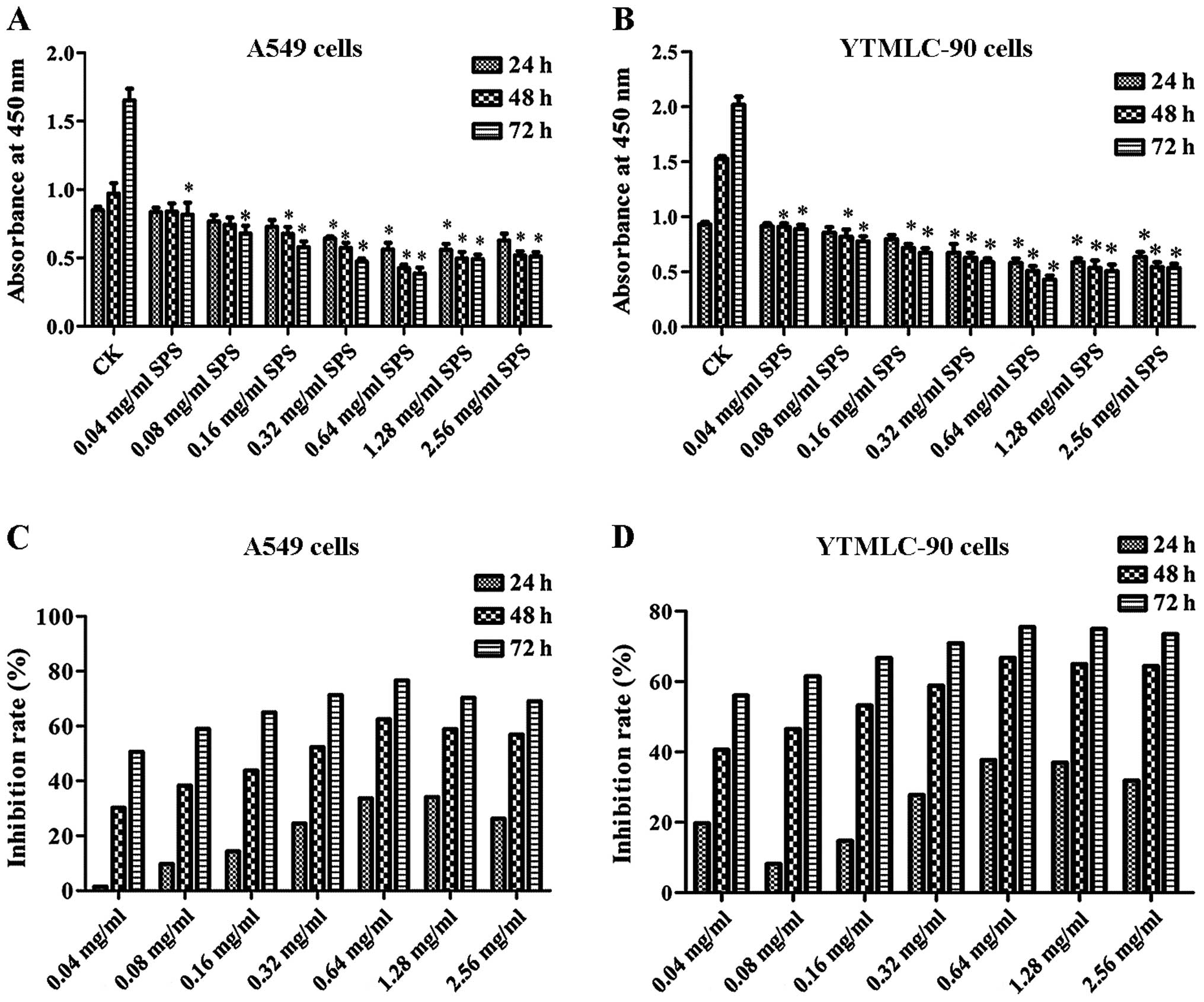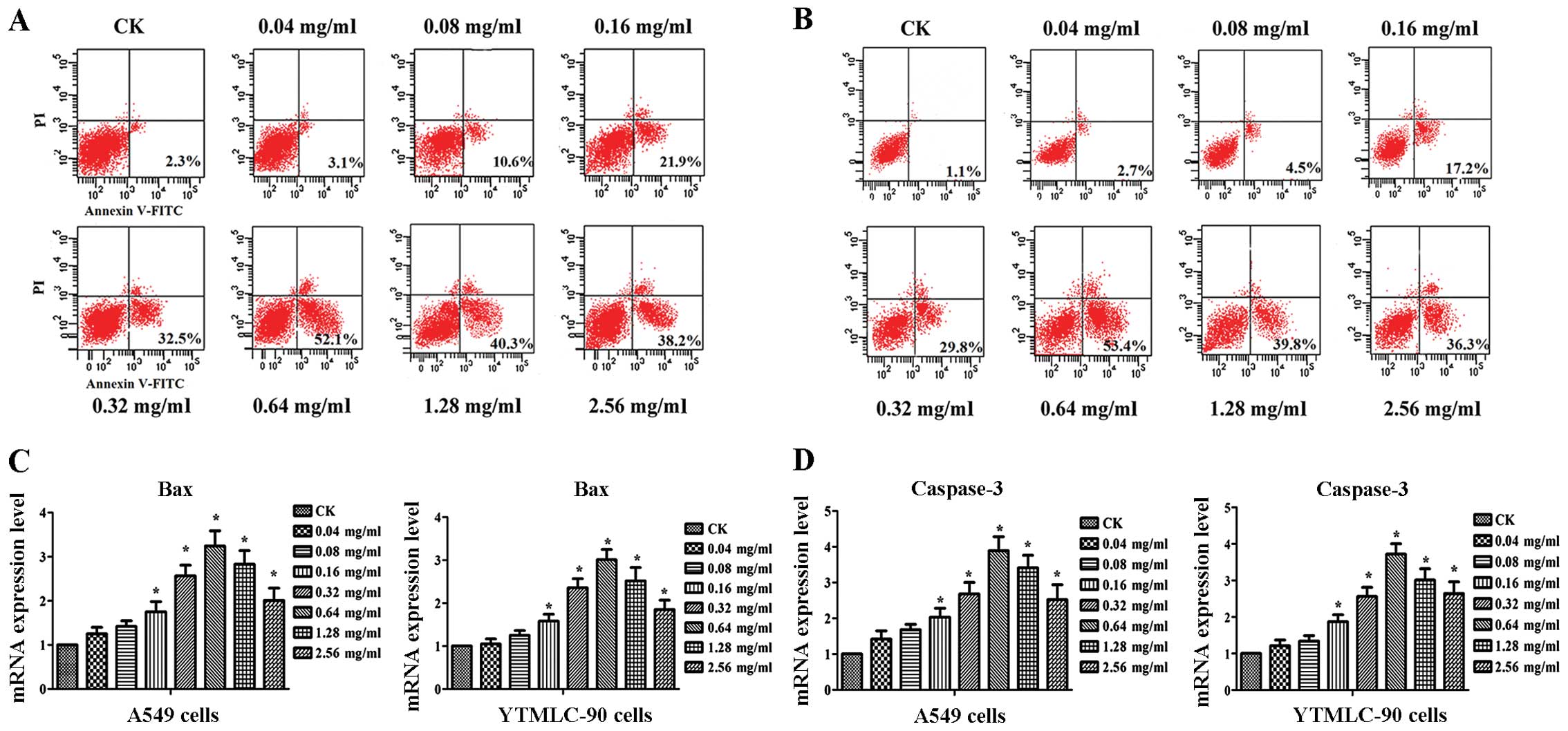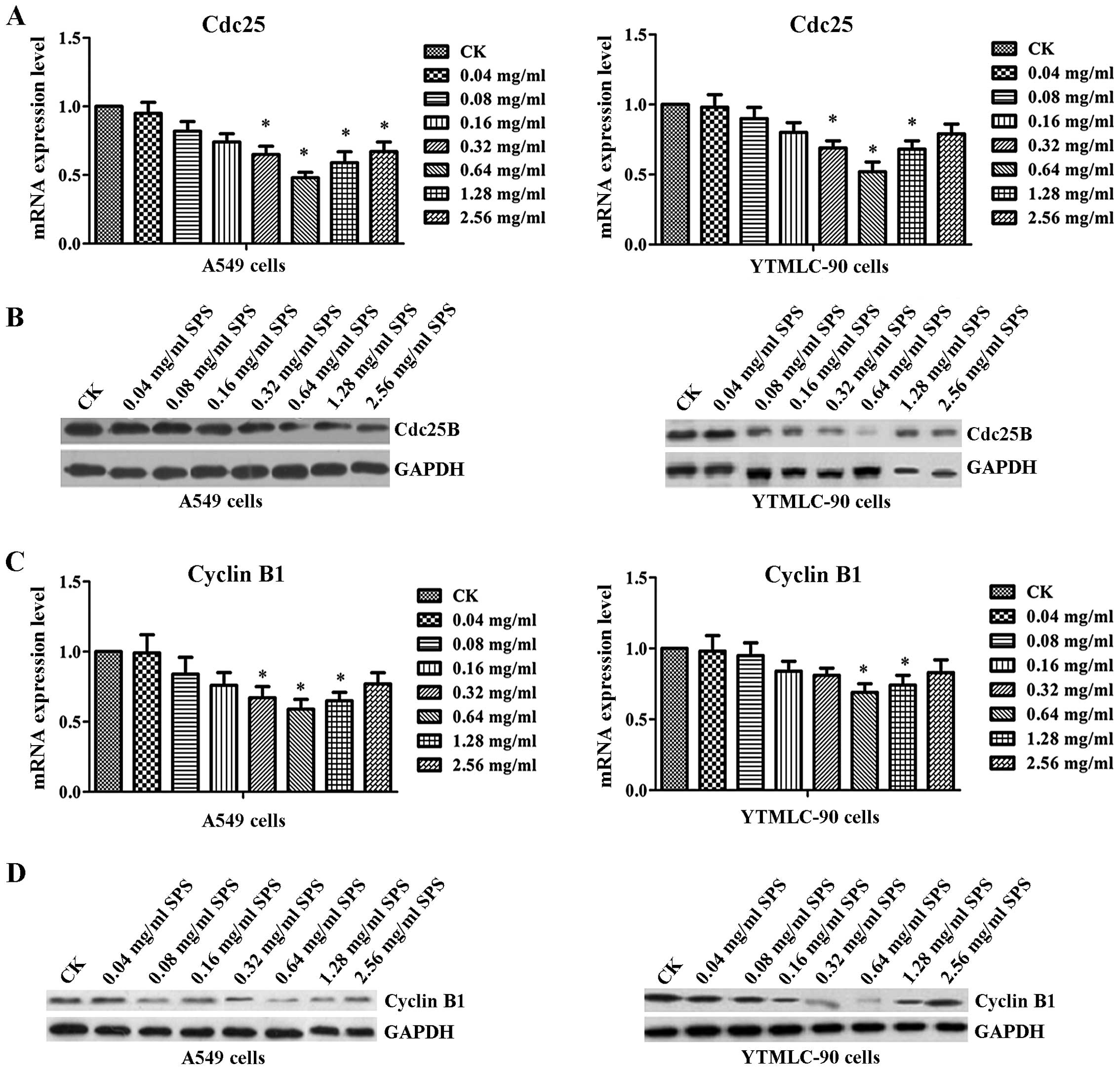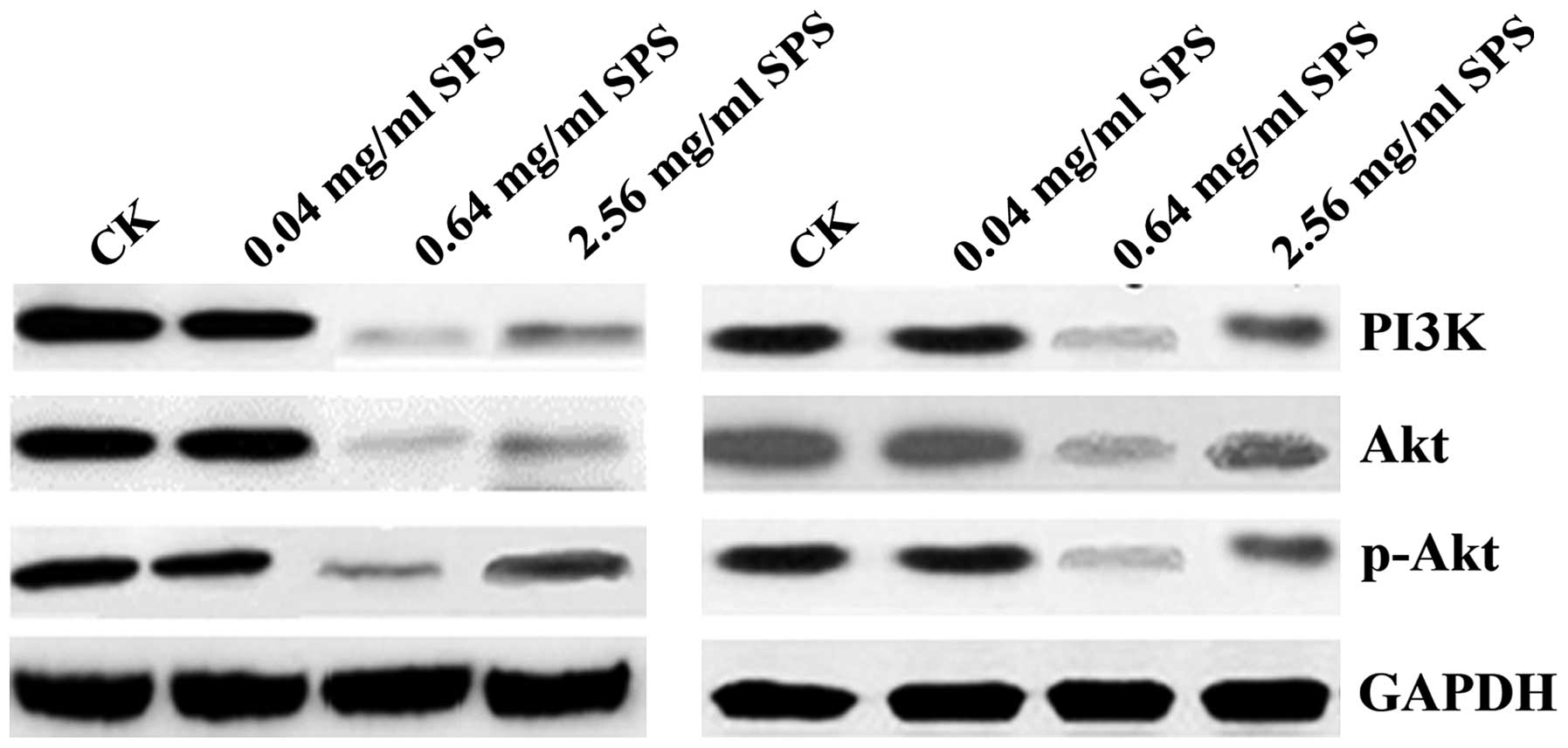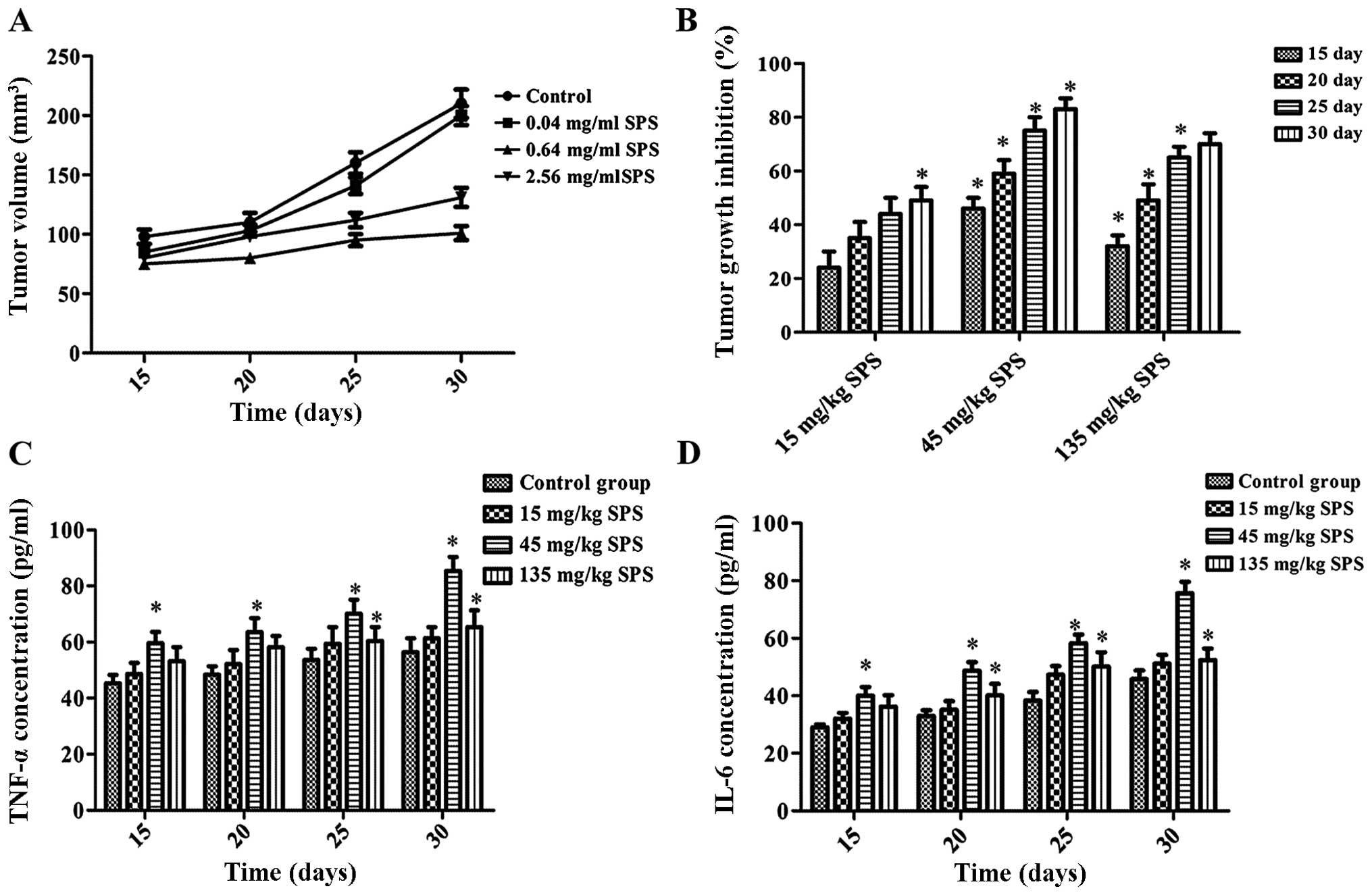|
1
|
Lev-Ari S, Starr A, Katzburg S, Berkovich
L, Rimmon A, Ben-Yosef R, Vexler A, Ron I and Earon G: Curcumin
induces apoptosis and inhibits growth of orthotopic human non-small
cell lung cancer xenografts. J Nutr Biochem. 25:843–850. 2014.
View Article : Google Scholar : PubMed/NCBI
|
|
2
|
Liloglou T, Bediaga NG, Brown BR, Field JK
and Davies MP: Epigenetic biomarkers in lung cancer. Cancer Lett.
342:200–212. 2014. View Article : Google Scholar
|
|
3
|
Hennessy BT, Smith DL, Ram PT, Lu Y and
Mills GB: Exploiting the PI3K/AKT pathway for cancer drug
discovery. Nat Rev Drug Discov. 4:988–1004. 2005. View Article : Google Scholar : PubMed/NCBI
|
|
4
|
Zhu Z, Sun H, Ma G, Wang Z, Li E and Liu Y
and Liu Y: Bufalin induces lung cancer cell apoptosis via the
inhibition of PI3K/Akt pathway. Int J Mol Sci. 13:2025–2035. 2012.
View Article : Google Scholar : PubMed/NCBI
|
|
5
|
Zhang X-Y, Kuang J-L, Yan C-S, Tu XY, Zhao
JH, Cheng XS and Ye XQ: NRSN2 promotes non-small cell lung cancer
cell growth through PI3K/Akt/mTOR pathway. Int J Clin Exp Pathol.
8:2574–2581. 2015.PubMed/NCBI
|
|
6
|
Chew CL, Lunardi A, Gulluni F, Ruan DT,
Chen M, Salmena L, Nishino M, Papa A, Ng C, Fung J, et al: In vivo
role of INPP4B in tumor and metastasis suppression through
regulation of PI3K/AKT signaling at endosomes. Cancer Discov.
5:740–751. 2015. View Article : Google Scholar :
|
|
7
|
Xu X, Zhang Y, Qu D, Jiang T and Li S:
Osthole induces G2/M arrest and apoptosis in lung cancer A549 cells
by modulating PI3K/Akt pathway. J Exp Clin Cancer Res. 30:332011.
View Article : Google Scholar : PubMed/NCBI
|
|
8
|
Hou Z, Zhao W, Zhou J, Shen L, Zhan P, Xu
C, Chang C, Bi H, Zou J, Yao X, et al: A long noncoding RNA Sox2ot
regulates lung cancer cell proliferation and is a prognostic
indicator of poor survival. Int J Biochem Cell Biol. 53:380–388.
2014. View Article : Google Scholar : PubMed/NCBI
|
|
9
|
Tian T, Li J, Li B, Wang Y, Li M, Ma D and
Wang X: Genistein exhibits anti-cancer effects via down-regulating
FoxM1 in H446 small-cell lung cancer cells. Tumour Biol.
35:4137–4145. 2014. View Article : Google Scholar : PubMed/NCBI
|
|
10
|
Zhou X, Tang L, Xu Y, Zhou G and Wang Z:
Towards a better understanding of medicinal uses of Carthamus
tinctorius L. in traditional Chinese medicine: A phytochemical and
pharmacological review. J Ethnopharmacol. 151:27–43. 2014.
View Article : Google Scholar
|
|
11
|
Fan S, Lin N, Shan G, Zuo P and Cui L:
Safflower yellow for acute ischemic stroke: A systematic review of
randomized controlled trials. Complement Ther Med. 22:354–361.
2014. View Article : Google Scholar : PubMed/NCBI
|
|
12
|
Li LJ, Li YM, Qiao BY, Jiang S, Li X, Du
HM, Han PC and Shi J: The value of safflower yellow injection for
the treatment of acute cerebral infarction: A randomized controlled
trial. Evid Based Complement Alternat Med.
2015:4787932015.PubMed/NCBI
|
|
13
|
Liu Y, Tian X, Cui M and Zhao S: Safflower
yellow inhibits angiotensin II-induced adventitial fibroblast
proliferation and migration. J Pharmacol Sci. 126:107–114. 2014.
View Article : Google Scholar : PubMed/NCBI
|
|
14
|
Toma W, Guimarães LL, Brito AR, Santos AR,
Cortez FS, Pusceddu FH, Cesar A, Júnior LS, Pacheco MTT and Pereira
CDS: Safflower oil: An integrated assessment of phytochemistry,
antiulcerogenic activity, and rodent and environmental toxicity.
Rev Bras Farmacogn. 24:538–544. 2014. View Article : Google Scholar
|
|
15
|
Ali Sahari M, Morovati N, Barzegar M and
Asgari S: Physicochemical and antioxidant characteristics of
safflower seed oil. Curr Nutr Food Sci. 10:268–274. 2014.
View Article : Google Scholar
|
|
16
|
Luo Z, Zeng H, Ye Y, Liu L, Li S, Zhang J
and Luo R: Safflower polysaccharide inhibits the proliferation and
metastasis of MCF-7 breast cancer cell. Mol Med Rep. 11:4611–4616.
2015.PubMed/NCBI
|
|
17
|
Sabah FS and Saleh AA: Evaluation of
antibacterial activity of flavonoid and oil extracts from safflower
(Carthamus tinctorius L.). J Nat Sci Res. 5:41–44. 2015.
|
|
18
|
Yu J, Sun R, Zhao Z and Wang Y:
Auricularia polytricha polysaccharides induce cell cycle arrest and
apoptosis in human lung cancer A549 cells. Int J Biol Macromol.
68:67–71. 2014. View Article : Google Scholar : PubMed/NCBI
|
|
19
|
Kim Y-J, Choi W-I, Jeon B-N, Choi KC, Kim
K, Kim TJ, Ham J, Jang HJ, Kang KS and Ko H: Stereospecific effects
of ginsenoside 20-Rg3 inhibits TGF-β1-induced
epithelial-mesenchymal transition and suppresses lung cancer
migration, invasion and anoikis resistance. Toxicology. 322:23–33.
2014. View Article : Google Scholar : PubMed/NCBI
|
|
20
|
Xi SY, Zhang Q, Liu CY, Xie H, Yue LF and
Gao XM: Effects of hydroxy safflower yellow-A on tumor capillary
angiogenesis in transplanted human gastric adenocarcinoma BGC-823
tumors in nude mice. J Tradit Chin Med. 32:243–248. 2012.
View Article : Google Scholar : PubMed/NCBI
|
|
21
|
Li W, Wu D, Wei B, Wang S, Sun H, Li X,
Zhang F, Zhang C and Xin Y: Anti-tumor effect of cactus
polysaccharides on lung squamous carcinoma cells (SK-MES-1). Afr J
Tradit Complement Altern Med. 11:99–104. 2014. View Article : Google Scholar : PubMed/NCBI
|
|
22
|
Cui H, Wang C, Wang Y, Li Z, Zhang Y, Chen
M and Li F: Pleurotus nebrodensis polysaccharide induces apoptosis
in human non-small cell lung cancer A549 cells. Carbohydr Polym.
104:246–252. 2014. View Article : Google Scholar : PubMed/NCBI
|
|
23
|
Yang X, Yang Y, Tang S, Tang H, Yang G, Xu
Q and Wu J: Anti-tumor effect of polysaccharides from Scutellaria
barbata D. Don on the 95-D xenograft model via inhibition of the
C-met pathway. J Pharmacol Sci. 125:255–263. 2014. View Article : Google Scholar : PubMed/NCBI
|
|
24
|
Sousa L, Garcia IJ, Costa TG, Silva LN,
Renó CO, Oliveira ES, Tilelli CQ, Santos LL, Cortes VF, Santos HL,
et al: Effects of iron overload on the activity of Na,K-ATPase and
lipid profile of the human erythrocyte membrane. PLoS One.
10:e01328522015. View Article : Google Scholar : PubMed/NCBI
|
|
25
|
Lu S-P and Zhao P-T: Chemical
characterization of Lycium barbarum polysaccharides and their
reducing myocardial injury in ischemia/reperfusion of rat heart.
Int J Biol Macromol. 47:681–684. 2010. View Article : Google Scholar : PubMed/NCBI
|
|
26
|
Ji Y, Ji C and Wang C: Study on S180 Tumor
Mice Erythrocyte Membrance Function of Sargassum Fusiform
Polysaccharides. 7th Asian-Pacific Conference on Medical and
Biological Engineering; Springer; pp. 531–533. 2008, https://www.researchgate.net/publication/226856649_Study_on_S180_Tumor_Mice_erythrocyte_Membrance_Function_of_Sargassum_Fusiform_Polysaccharides.
|
|
27
|
Chu H-L, Mao H, Feng W, Liu JW and Geng Y:
Effects of sulfated polysaccharide from Masson pine (Pinus
massoniana) pollen on the proliferation and cell cycle of HepG2
cells. Int J Biol Macromol. 55:104–108. 2013. View Article : Google Scholar
|
|
28
|
Mao F, Xiao B, Jiang Z, Zhao J, Huang X
and Guo J: Anticancer effect of Lycium barbarum polysaccharides on
colon cancer cells involves G0/G1 phase arrest. Med Oncol.
28:121–126. 2011. View Article : Google Scholar
|
|
29
|
Cao Y, Ruan Y, Shen T, Huang X, Li M, Yu
W, Zhu Y, Man Y, Wang S and Li J: Astragalus polysaccharide
suppresses doxorubicin-induced cardiotoxicity by regulating the
PI3k/Akt and p38MAPK pathways. Oxid Med Cell Longev.
2014:6742192014. View Article : Google Scholar : PubMed/NCBI
|
|
30
|
Chen J, Jin X, Chen J and Liu C:
Glycyrrhiza polysaccharide induces apoptosis and inhibits
proliferation of human hepatocellular carcinoma cells by blocking
PI3K/AKT signal pathway. Tumour Biol. 34:1381–1389. 2013.
View Article : Google Scholar : PubMed/NCBI
|
|
31
|
Xie X, Zou G and Li C: Antitumor and
immunomodulatory activities of a water-soluble polysaccharide from
Chaenomeles speciosa. Carbohydr Polym. 132:323–329. 2015.
View Article : Google Scholar : PubMed/NCBI
|
|
32
|
Bao XL, Yuan HH, Wang CZ, Fan W and Lan
MB: Polysaccharides from Cymbopogon citratus with antitumor and
immunomodulatory activity. Pharm Biol. 53:117–124. 2015. View Article : Google Scholar
|
|
33
|
Wakabayashi T, Hirokawa S, Yamauchi N,
Kataoka T, Woo JT and Nagai K: Immunomodulating activities of
polysaccharide fractions from dried safflower petals.
Cytotechnology. 25:205–211. 1997. View Article : Google Scholar : PubMed/NCBI
|















